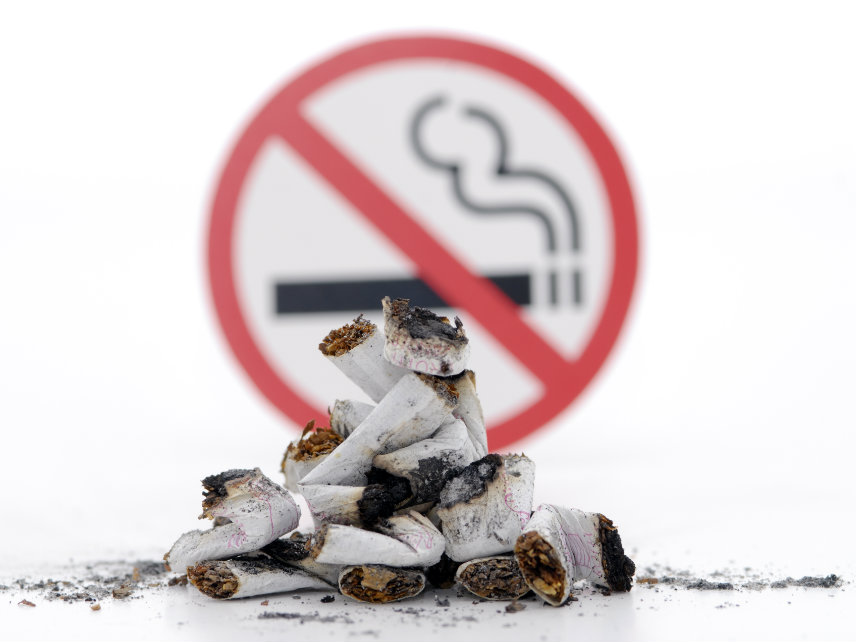Some California Cities Are Making It Harder to Quit Smoking
Bans of flavored tobacco products end up leaving smokers with few options for kicking the habit, and do little to improve public health.

In a rush to crack down on tobacco use, more than a dozen local governments across California have recently passed laws that will—if they work—nudge more people to use cigarettes instead of potentially less unhealthy alternatives.
Led by San Francisco and Oakland, cities including Sonoma, Berkeley, and Manhattan Beach have passed ordinances banning the sale of flavored tobacco products. Similar bans have been passed but not yet implemented in Beverley Hills, Palo Alto, San Mateo, and elsewhere. The prohibitions are aimed at limiting the availability of menthol cigarettes and to stop tobacco products from supposedly being marketed to children, but they are also sweeping up flavored vaping options and other forms of non-combustible tobacco products that are alternatives to cigarettes and have been shown to help smokers quit.
The unintended but completely predictable outcome? Former smokers who have already switched to e-cigarettes (or non-combustible tobacco products like snus) might find themselves forced to pick up the cancer sticks again in order to get their dose of nicotine—thanks to the always well-intentioned intervention of government officials.
These California cities are moving in exactly the wrong direction, as a growing body of scientific and medical evidence demonstrates that vaping helps smokers quit. In January, the National Academies of Sciences, Engineering, and Medicine issued an advisory opinion to the Food and Drug Administration (FDA) showing that e-cigarettes could be life-savers. "E-cigarette aerosol contains fewer numbers and lower levels of most toxicants than smoke from combustible tobacco cigarettes does," wrote University of Washington toxicologist David Eaton, who authored the report. "Laboratory tests of e-cigarette ingredients, in vitro toxicological tests, and short-term human studies suggest that e-cigarettes are likely to be far less harmful than combustible tobacco cigarettes."
Even long-time smoking critics like Michael Siegel, who spent two years on the Center for Disease Control's Office on Smoking and Health, have come around to the potential for non-combustible tobacco alternatives. Vaping is an especially powerful anti-smoking tool because it so closely simulates the act of smoking without as serious of health concerns. "Not only do they provide nicotine, but they simulate cigarette smoking," Siegel, now a professor at Boston University's School of Public Health, said earlier this year. "Thus, unlike nicotine patches or nicotine gum or other drugs, they address all of the behavioral, physical, and even social aspects of the smoking addiction."
Even without the unintended public health consequences, it's worth questioning if these localized bans are likely to succeed in reducing tobacco use. Nicotine addicts are going to get their hit from somewhere, and banning these products is only likely to drive business towards the already-thriving black market for tobacco products in California. Legitimate businesses will be forced to close, but public health won't improve.
There's also scant evidence that current smoking trends require a major civic intervention. Cigarette smoking by teenagers has continued to fall despite a surge in experimentation with vaping, and last year it reached the lowest level ever recorded by the Monitoring the Future Study, which began surveying high school students in 1975. If banning flavored tobacco products is meant to make smoking less attractive to youngsters, well, it seems like teens are already well ahead of officials in San Francisco and elsewhere.
In some places, smokers are fighting back against the bans.
"We just legalized marijuana. Now you want to ban menthol cigarettes?" Shawn Richard, who participated in a protest at San Francisco's city hall earlier this month, told a local TV station. "I mean come on. For real? That doesn't make any sense."
A voter petition delayed the implementation of the flavored tobacco ban in San Francisco. Voters will go to the polls in June to decide whether to allow it to proceed.
Other localities that have passed similar bans would be wise to reconsider the incentives being created. The main beneficiary of San Francisco's ban, says Joel Nitzkin, a public health physician and senior fellow with the R Street Institute, a free market think tank in Washington, D.C., are the "big tobacco cigarette companies that anti-tobacco advocates love to hate."
"The losers will be the teens who could have been diverted from cigarettes," says Nitzkin, "and smokers who otherwise would have quit using flavored vaping products."


Show Comments (26)